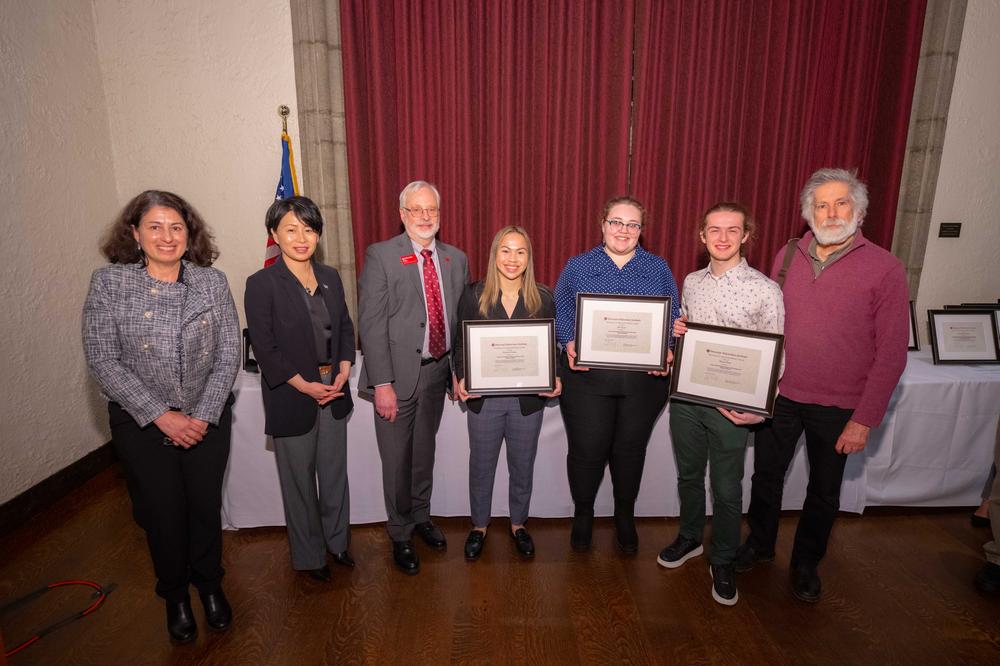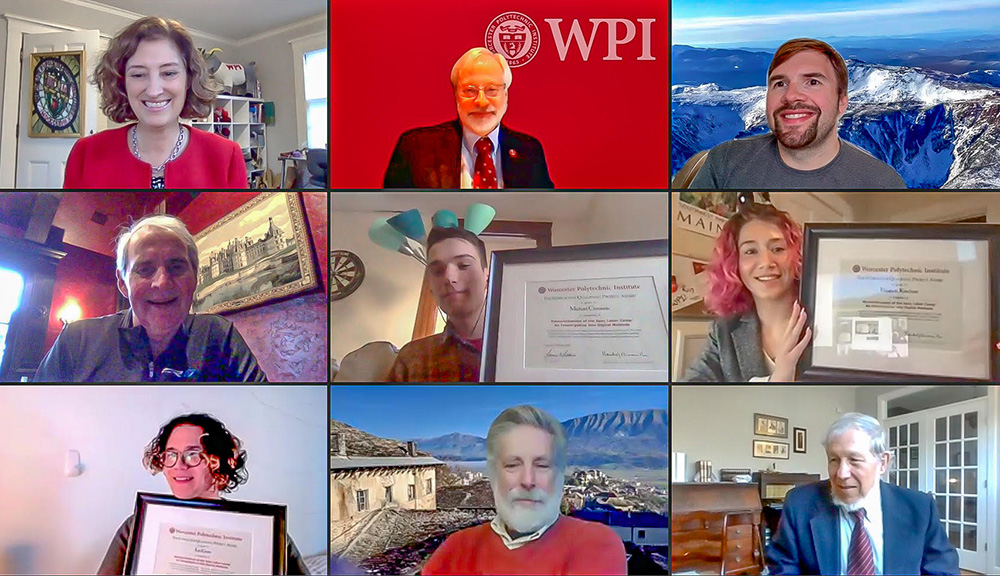A team of Worcester Polytechnic Institute (WPI) undergraduate students that researched and implemented solutions for improving water and sanitation in rural Namibia won the prestigious WPI President’s IQP Award on Friday, Jan. 27.
As part of their required IQP (Interactive Qualifying Project), WPI seniors Valerie A. Boutin of Salem, N.H., Caitlin E. Butler of Boston, Mass., Samuel J. Kesseli of Greenland, N.H., and Mary C. McCorry of Marshfield, Mass., traveled to the Southwest African country of Namibia, which has a dry desert climate and scarce water supply. The lack of surface water and annual rainfall make water conservation essential for sustainability in rural Namibian communities. For more information on this project see Namibia.
In an editorial, the Worcester Telegram & Gazette said the winning IQP is "an illustration of how and why higher education is worth every penny, both to the students, their communities, and even the world." Read the editorial . (Subscription may be required)
In the rural regions of Namibia, farming communities struggle to obtain water fit for human consumption. Groundwater contamination poses a risk to Namibian farming communities. The team’s goal was to analyze and improve water quality and sanitation on Odendaal farms in southern Namibia. Through interviews with farmers, meetings with local experts, and water tests, they established a baseline with social and environmental components, organized a solution to improve water and sanitation, and piloted a dry sanitation system.
The WPI team identified nitrate and coliform bacteria as the most threatening contaminants, attributing contamination primarily to livestock in the vicinity of boreholes used to draw groundwater, and human sanitation practices such as pit latrines. Under the guidance of professors Ingrid Shockey and Ulrike Brisson they oversaw the construction of a waterless toilet facility and a filtration system for drinking water for a Namibian family. They also educated farmers on the correlation between proper sanitation and a healthy drinking water supply.
The IQP is one of two projects required of WPI undergraduates; it allows students to pursue hands-on, real-world research opportunities all over the world. Working in teams under the guidance of faculty advisors, students conduct their research either locally or at one of 26 WPI-sponsored project centers to address—and solve—real problems that lie at the interface of science, technology, social issues, and human needs. (WPI has sent more undergraduate engineering and science students abroad for academic research than any other university in the United States.) Through participation at project centers, WPI students address local issues, develop an understanding of other cultures, and see how their lives and work will play out on a global stage.
During the awards presentation at Higgins House, President Berkey congratulated the winning project team and the four finalists for their impressive work, and emphasized the importance of the IQP in WPI’s curriculum.
"We should always remember the brilliance of those who crafted the WPI Plan, and especially the wisdom of placing this IQP experience right at the heart of it," he said. "There are lots of colleges and universities these days who have taken WPI’s wisdom and tried to figure out how to have project-based learning. I haven’t seen anyone yet, among all their various study-abroad programs and project activities, that brings as much learning and education together as the work that WPI students do in the IQP.
"You represent the educational philosophy and ideals of WPI so well, and you are our ambassadors, whether it is in the city of Worcester, or locations in this country, but especially around the world. Especially at a time where the best of America needs to be understood by those communities around the world as a giving and caring and thoughtful and innovative people, and you certainly convey that message."
Last academic year, more than 250 student teams completed IQPs. Of those, 45 teams entered their projects for WPI’s annual coveted President’s IQP Award, and the best five projects were selected to vie for the award. To be considered, projects must be superior in conception, execution, and presentation. The finalists gave their presentations before WPI President and CEO Dennis D. Berkey and a panel of judges: Elizabeth Hitchcock ’02, owner of Hitchcock Creations; Mark P. Rice, dean of WPI’s School of Business; Phil Ryan ’65, retired chief executive officer of Merchants Automotive Group; and Myles Walton ’97, a director and senior aerospace/defense analyst at Deutsche Bank.
The other finalists:
• "Measurement and Analysis of Walkability in Hong Kong," by Michael Audi of Ballston Spa, N.Y., Kathryn Byorkman of Braintree, Mass., Alison Couture of Hampstead, N.H., and Suzanne Najem of Derry, N.H. For more information on this project, see Hong Kong.
• "Initiation Site Development in Khayelitsha, Cape Town: Addressing the Challenges of Urban Initiation While Preserving Tradition and Culture," by Qiu Chen of Suzhou, China, Luis Quiroga of Worcester, Mass., Matthew Connolly of Corinth, Maine, and Andrew Stewart of Londonderry, N.H. For more information on this project, see Cape Town.
• "Water Resources Development in Isaan, Thailand: The Social Case for Ban Thad," by Daniel Bjorge of Swansea, Mass., Jessica Booth of Williston, Vt., Katrina Crocker of Norfolk, Mass., and David Warfel of Miami, Fla. For more information on this project, see Thailand.
• "Strengthening Spaza Shops in Monwabisi Park," by Likuvi Chebelyon-Dalizu of Gales Ferry, Conn., Zack Garbowitz of Chatham, N.J., Alexandra Hause of Littleton, Colo., and Devin Thomas of Waltham, Mass. For more information on this project, see Monwabisi Park.



